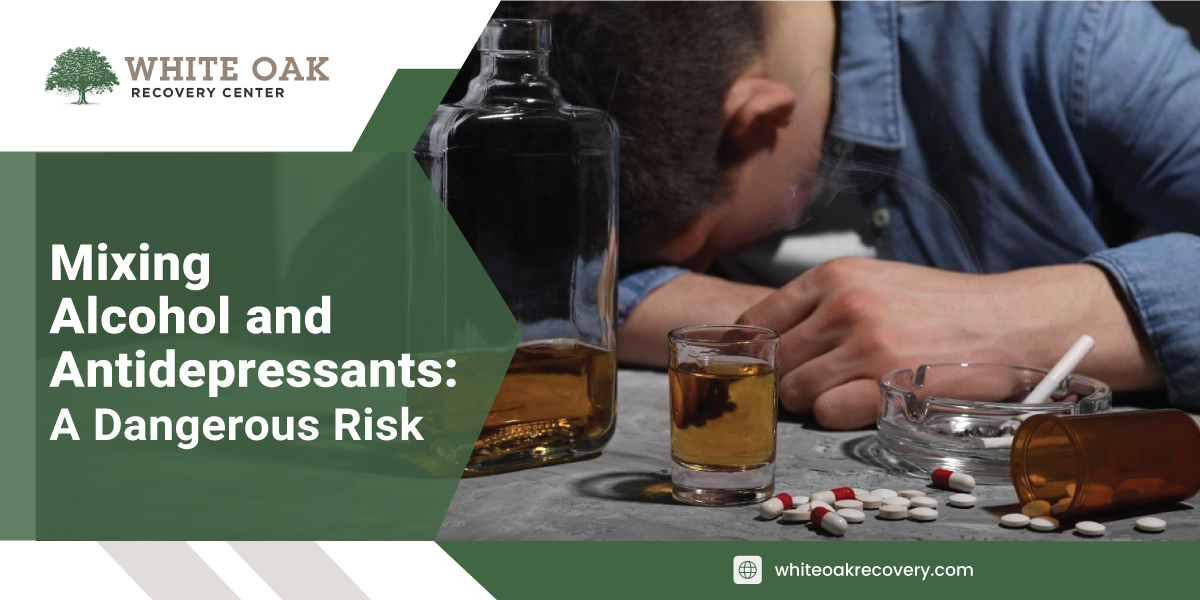Mixing Alcohol and Antidepressants: A Dangerous Risk


Medical Writer:
Reviewer:

Johnny Kim
Executive Psychotherapist
Medical Writer:
Reviewer:

Johnny Kim
Executive Psychotherapist
Alcohol and antidepressants are the most prevalent substances consumed in the United States. Yet, there is a common oversight regarding their dangerous health risks and side effects, mainly when used simultaneously.
Many people on antidepressants drink alcohol as another way to relieve their depression, ignoring its dangerous reactions because it improves your mood in the short term.
Table of Contents
ToggleHowever, the truth remains that regardless of your drinking habits, regular consumption, or even the occasional drink— any amount of alcohol with antidepressants is dangerous.
What Are Antidepressants?
Antidepressants help with depression and mood disorders by balancing chemicals in the brain. They can reduce or get rid of symptoms of mental illness. An example of a commonly prescribed antidepressant is a selective serotonin reuptake inhibitor, SSRIs.
These medications exhibit a cumulative effect, requiring consistent administration for therapeutic benefits. A healthcare professional should oversee the stopping of antidepressants and gradually taper to avoid negative effects.
What Will Happen if I Mix Antidepressants with Alcohol?
Combining alcohol and antidepressants can lead to chemical interactions that diminish the drugs’ effectiveness and potentially exacerbate depression symptoms.
Both antidepressants and alcohol are known to induce dizziness, sleepiness, and reduced motor skills, even at minimal alcohol concentrations. This combination significantly intensifies these effects, posing risks when engaging in activities like driving or operating machinery.
Moreover, the neurotransmitters and organs that process antidepressants are also involved in alcohol metabolism. Consuming both of these substances may overburden the system, heightening the risk of alcohol poisoning.
Drinking alcohol with monoamine oxidase inhibitors (MAOIs), a type of antidepressant, can cause a dangerous spike in blood pressure. This increase could be fatal.

How Much Alcohol Can You Drink While on Antidepressants?
The National Alliance on Mental Illness (NAMI) firmly discourages the consumption of alcohol when on antidepressants, stating that if you choose to drink, you should first determine the effects of your antidepressant medication.
If you drink alcohol while on antidepressants, NAMI suggests having it with food and water and not drinking too much. Moderate drinking means one drink per day for women and two for men. A standard drink is defined as:
- 12 oz beer
- 5 oz of wine
- 1.5 oz of hard liquor
Even with just one alcoholic beverage consumed while on antidepressants, it’s crucial to steer clear of driving or operating heavy machinery to ensure utmost safety.
Some people who binge drink or think they can handle alcohol well may think that mixing alcohol with antidepressants won’t harm them. Such people may initially mask the immediate impacts of their damaging habits, including smoking or excessive drinking. Still, they remain at an elevated risk of developing severe and lasting health problems.
These health complications may include, but are not limited to, heart disease, cancer, respiratory difficulties, and liver damage. The consequences of these habits might not be instantly noticeable, but they can significantly degrade one’s health over time. It’s important for people to understand how their actions can affect their health in the long run. Changing behaviors to be healthier can reduce the risk of severe long-term health conditions.
Side Effects of Combining Antidepressants
Mixing antidepressants with alcohol can have different effects on each person. It depends on their body, the type of antidepressant, and how much alcohol they drink.
Common side effects experienced from mixing alcohol and antidepressants include:
- Dizziness
- Drowsiness
- Memory loss
- Impaired coordination
- Headache
- Nausea
- Vomiting
- Impaired judgment
- Significant blood pressure increases
- Confusion
Frequent mixing of alcohol and antidepressants heightens the risk of:
- Developing substance use disorders
- Blood clots
- Stroke
- Alcohol withdrawal syndrome (AWS)
- Liver damage
- Memory impairment
- Heart damage
- Sexual dysfunction
- Genetic abnormalities in offspring
- High blood pressure
- Seizures
- Alcohol poisoning
- Suicidal thoughts
- Serotonin syndrome, the excessive activation of brain receptors
Increased Risk of Depression
Studies have established that the intake of alcohol in combination with antidepressants can aggravate symptoms of depression and anxiety. People with depression have a higher tendency to abuse substances, particularly those undergoing treatment for depression and anxiety.
According to the National Institute on Alcohol Abuse and Alcoholism (NIAAA), people who binge drink often are twice as likely to think about suicide. In 25% of suicide cases, the person had a blood alcohol level above 0.08%. In one out of every four suicide cases, the person had a blood alcohol content higher than 0.08%
Depressive disorders are frequently diagnosed in people with substance use disorders. Alcohol consumption lowers the potency of antidepressants and reduces the likelihood of maintaining a medication schedule among regular drinkers.
People battling alcohol addiction frequently require professional intervention to stop drinking. Accredited facilities are the best places for people with mental health and substance use disorders to receive care.

Substance Abuse and Alcohol Addiction Treatment
If you’re facing challenges with substance abuse and mental health, remember, you’re not alone. At White Oak Recovery Center, we understand the difficulty of feeling overwhelmed by these struggles. We embrace an evidence-based, holistic approach to address every facet of your addiction, not merely the symptoms.
At White Oak Recovery Center, our onsite medical detox provides around-the-clock care and assistance from experienced and licensed medical experts, ensuring your safety as your body withdrawals. We offer medication-assisted treatment and dual diagnosis treatment to address any co-occurring mental health conditions.
A healthy life rooted in recovery may only take a phone call. Don’t hesitate to contact our team of compassionate treatment specialists and reach out today.

Am I covered for addiction treatment?
Your insurance may cover treatment. Call now for an entirely free and confidential assessment. Recovery starts with a phone call.

- “Can I Drink Alcohol While Taking Antidepressants?” National Alliance on Mental Illness, 2024.
- Weathermon, Ron, and Crabb, David W., “Alcohol and Medication Interactions.” Alcohol Research and Health, 1999.
- Graham, Kathryn, and Massak, Agnes, “Alcohol Consumption and the Use of Antidepressants.” Canadian Medical Association Journal, Feb. 2007.
Medical Disclaimer:







